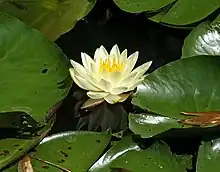nymphaea
English
Pronunciation
- (UK) IPA(key): /nɪmˈfiːə/
Etymology 1
From Latin nymphaea, from Ancient Greek νυμφαῖα (numphaîa), feminine singular form of νυμφαῖος (numphaîos, “sacred to the nymphs”), from νύμφη (númphē, “nymph”).
Noun
nymphaea (plural nymphaeas)
- (botany) Originally, the European white water lily; later also, a species of the genus Nymphaea.
- 1624, Democritus Junior [pseudonym; Robert Burton], The Anatomy of Melancholy: […], 2nd edition, Oxford, Oxfordshire: Printed by John Lichfield and James Short, for Henry Cripps, →OCLC, partition II, section 5, member 1, subsection v:
- Guianerius, cap. 8, tract. 15, would have them used twice a day, and when they come forth of the baths, their backbones to be anointed with oil of almonds, violets, nymphæa, fresh capon-grease, etc.
Etymology 2
Inflected forms.
Latin

nymphaea (water lily)
Etymology
From Ancient Greek νυμφαία (numphaía).
Pronunciation
- (Classical) IPA(key): /nymˈpʰae̯.a/, [nʏmˈpʰäe̯ä]
- (modern Italianate Ecclesiastical) IPA(key): /nimˈfe.a/, [nimˈfɛːä]
Declension
First-declension noun.
| Case | Singular | Plural |
|---|---|---|
| Nominative | nymphaea | nymphaeae |
| Genitive | nymphaeae | nymphaeārum |
| Dative | nymphaeae | nymphaeīs |
| Accusative | nymphaeam | nymphaeās |
| Ablative | nymphaeā | nymphaeīs |
| Vocative | nymphaea | nymphaeae |
Related terms
Descendants
- Translingual: Nymphaea
References
- “nymphaea”, in Charlton T. Lewis and Charles Short (1879) A Latin Dictionary, Oxford: Clarendon Press
- nymphaea in Gaffiot, Félix (1934) Dictionnaire illustré latin-français, Hachette.
- “nymphaea”, in William Smith, editor (1854, 1857), A Dictionary of Greek and Roman Geography, volume 1 & 2, London: Walton and Maberly
This article is issued from Wiktionary. The text is licensed under Creative Commons - Attribution - Sharealike. Additional terms may apply for the media files.